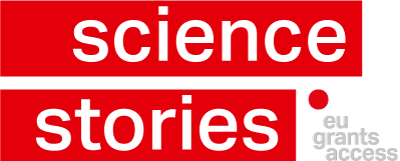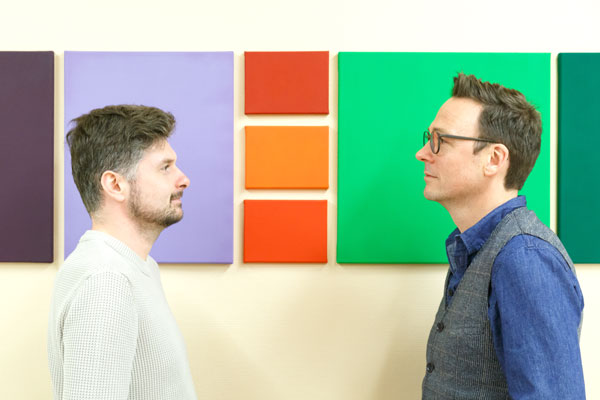
Where medicine alone cannot help
What happens when a child is born with a variation of sex characteristics? And what does the care of these people look like over the years? A conversation with Paediatrician and Bioethicist Jürg Streuli and his doctoral student Martin Gramc about intersex and the European Training Network INIA.
Dr. Streuli, you specialise in complex medical conditions, including intersex. Can you classify these terms for us?
Jürg Streuli: In complex chronic conditions, a child and his or her family are confronted over a longer period of time by several specialists with different therapy options that are usually difficult to weigh up – and in the process the transitions between medicine and social issues frequently become bumpy. For the families, this is often the beginning of a life in two worlds with different languages and topics, the world of medicine and that of the social environment. Well-intentioned tips, false restraint, bias and even open incomprehension often present the family with difficult tasks for which they may need support. In the case of innate variations in physical sex characteristics, colloquially also called intersex, or in medical jargon variation of sex characteristics (VSC), the relationship between the medical and social worlds is particularly complex and often also problematic.
What happens when a child is born with an intersex trait?
VSC is not a disease per se, but a variation that can actually have life-threatening consequences in certain forms and not in others. So, when a child is born, it is primarily important to identify or rule out life-threatening aspects such as salt loss in adrenogenital syndrome, or AGS for short, as quickly as possible without giving the parents the feeling that something is fundamentally wrong with their child.
Do all persons with VSC have AGS?
No, AGS occurs in about 1 in 12,000 births, but VSCs are about twice as common.
Are VSCs always instantly recognisable?
No. VSC is a collective term for many peculiarities in our genetics, our hormones, our gonads and the anatomy of our external genitals. And if you look for peculiarities in the genome, you will find them in all humans. So VSCs are not abnormal per se, but probably an integral part of our evolution. It is usually not at all clear whether a variation also has a disease value. This raises the question of what good medicine can do.
What is the most difficult aspect about working with children born with VSC?
It gets complicated when the sex of the child is not clear and the sentence “it’s a girl” or “it’s a boy” is unclear at birth. Then, one thing is needed above all: professionalism with calmness, empathy and space for bonding, i.e. the promotion of a loving bond between parents and child. One may heartily congratulate the parents on the birth of their child. However, the staff must be appropriately trained not to stand shocked in front of the child’s genitals themselves or to say immediately, «Don’t worry, it can be operated.» Indeed, for certain forms, surgery can be part of the optimal path, but VSC is not something that can be “operated away”. It is a process through childhood into adulthood that the parents and the child do not have to go through alone. What support is needed for these families and their environment is one of the central questions of our INIA research project.
You are supervising two doctoral students in the European Training Network INIA on new, interdisciplinary approaches to the care of people with VSC. What do you expect from this study?
I am a fan of action research – and that is also what we hope for: that just by interviewing a team, positive changes are triggered in the team itself. And also, that professionals realise that peer support groups are needed, and that these groups in turn realise that they are wanted. It is a responsibility of all of us as a society to welcome these children and empower their parents to find their way. A big topic here, on which we have several research projects, is participatory decision-making, or shared decision-making, which supports the parents and their child on their shared journey.
Martin Gramc, the goal of the Training Network is to enable people with VSC to live a self-determined life without surgical intervention. How often is surgery still performed?
Martin Gramc: In Germany it can be seen that the introduction of the third sex and the option to change your legal documents has not really been embraced by parents: there are not fewer, but even more surgeries on intersex children than before.
Why are surgical interventions increasing?
It very much depends on the country and on the clinic. Not every single country has enough resources to have teams dealing with intersex and not all the teams are equally progressive. But it also depends on what kind of intersexual variation you have, so if it is primarily something that concerns hormonal disbalances, this tends to be treated with hormone therapy. But if it is more of a genital variation and if the team is primarily led by a urologist, then the push for surgery is stronger from doctors, but also from parents, because they are distressed that their children do not fit into the perfect image of being male or female. In the dressing room or playing in the streets, others might see and be scared. Parents do not want their child to be excluded and often push for surgery.
So, it is a societal problem?
Yes, our society has not become more open to our bodily differences and about our ideas of what is a man or a woman. Even though there is this explosion of body positivity in urban areas and respect for sexual and gender minorities, there is simultaneously a push for even more traditional masculine or feminine roles and bodies. We haven’t yet reached the point where we say it is okay to have a body that is different.
Is surgery the main problem?
No, it is just one part. Another important part is how to tell an intersex person that they have this certain variation. Because often there is no need for operation, and no need for any kind of medical treatment. But it is crucial for intersex people that they know this when they see for example a different doctor so they can get the treatment they need. Oftentimes parents are afraid to tell children about their variation, because they believe that this is something shameful. The teams then have to push parents to inform their children and convince them as legal guardians that they are obliged by law but also due to medical practice to inform their children.
What is the focus of your part pf the study?
I focus on medical teams and different support groups that may or may not be involved in the shared decision-making. I investigate what happens when an intersex child is born, how these medical professionals come together and decide how to convey information about intersex children to their parents, telling them what it means to have an intersex child but also to let these medical teams get involved.
One of your study’s goals is to find the ideal composition of the medical team. Did you find it already?
Yes. It should include medical professionals, psychosocial support providers as well as peer support groups for parents and peer support groups for intersex people. These two groups are usually not present in the medical teams.
Why are peer support groups so important?
Because they consist of people who lived this life and experienced the medical treatments. And you need to have somebody who knows what it means to have an intersex child or – even more importantly – to live an intersex life.
How do you find such peer supporters?
It depends on the country. In certain countries there are support groups who have been there three decades already. In the big cities of the United States for example, Germany and the United Kingdom, you find respective associations. But in Slovenia, where I come from, and even in Sweden, you have hardly any intersexual support groups.
Where does Switzerland stand?
Switzerland is a pioneer when it comes to ethical recommendations for the treatment of people with VSC – these are even more progressive than the German ones. The Swiss Ethics Advisory Board published these standards in 2012.That brought a positive change in the political debate in other countries that followed, such as Belgium. In Germany they changed the law. But also countries like Argentina and Columbia have been very progressive in this field by showing that these medical treatments are done for the good of the child and that they should respect the autonomy. So, not everything which is progressive is accomplished in the global north.
What are the most important findings in your work so far?
First, that psychosocial support is not yet as developed as it should be: my research and other studies show that this support still plays a subordinate role. Psychologists and psychiatrists very rarely see a child with VSC and his or her family without the presence of a doctor.
And the second?
Transition of care from childhood to adulthood happens very rarely. Adults with VSC have difficulties in finding appropriate medical care. Treatment for such people is very much focused on paediatrics. This is probably the most important finding of my study, which I hope will also bring about a change for people with VSC. One of the aims of this project is to write ethical recommendations for the medical treatment of these people, and this will be part of that.
And where are the biggest challenges in implementing these study results?
Jürg Streuli: We must not give up. It takes time. Change is a process that may fail if we do not continue to reach out to each other and if we say goodbye to each other too soon. It may be that activists lose patience at some point – understandably so, because medicine and society are enormously tenacious in their changes. The Federal Council has now decided that it does not want a third gender. The justification was that society is not yet ready and that sounds understandable, but it is too sweeping. We have a consensus culture and for that we also need development.
Are you in favour of a third sex?
I am in favour of steps that remove unnecessary hurdles. For example, I don’t think gender should be in the passport. It is not in the ID either.
Will adult treatment be the follow-up project to INIA?
We have been trying to build a good transition for many years – but it is very difficult. There is a lack of holistic approaches. But there is much reason for hope and already follow-up projects that can build on our findings from INIA: in a Citizen Science project at the University of Zurich, for example, we are trying to firmly establish transprofessional cooperation at eye level with all stakeholders with an umbrella organisation in Switzerland. It’s mostly small but steady steps with an ongoing learning process that take us forward. Especially from the peer support groups, the families, but also the growing children, we still have much to learn.
Interview with Martin Gramc
Jürg Streuli
Dr. med. Jürg Streuli has been a Senior Assistant at the Institute of Biomedical Ethics at the University of Zurich since 2015, as well as a Senior Physician at the Children's Hospital Zurich and, since 2019, a Senior Physician at the Children's Hospital of Eastern Switzerland in St. Gallen. He studied medicine in Zurich and specialised in medical ethics and palliative care in childhood and adolescence. Jürg Streuli is married, father of two children and lives in Uznach.
Martin Gramc
Martin Gramc is an LGBTIQ+ activist, researcher and author from Slovenia. He graduated with a Master's degree in Gender Studies from the University of Ljubljana in 2018 and then worked at the Peace Institute in Ljubljana and in various LGBTI+ organisations and campaigns in his home country, in Croatia and in Germany (Berlin). Since January 2021, he has been working as a PhD student at the University of Zurich.
Horizon 2020 Project
INIA: Intersex – New Interdisciplinary Approaches
- Programme: Marie Skłodowska-Curie European Training Networks
- Duration: 1. March 2020 – 31. August 2024 (54 months)
- Contribution for University of Zurich: 562’553 €





